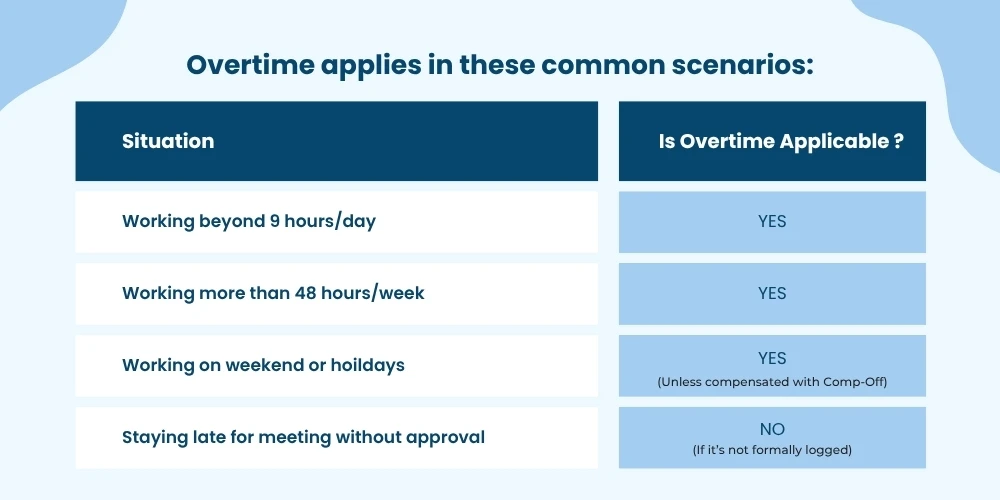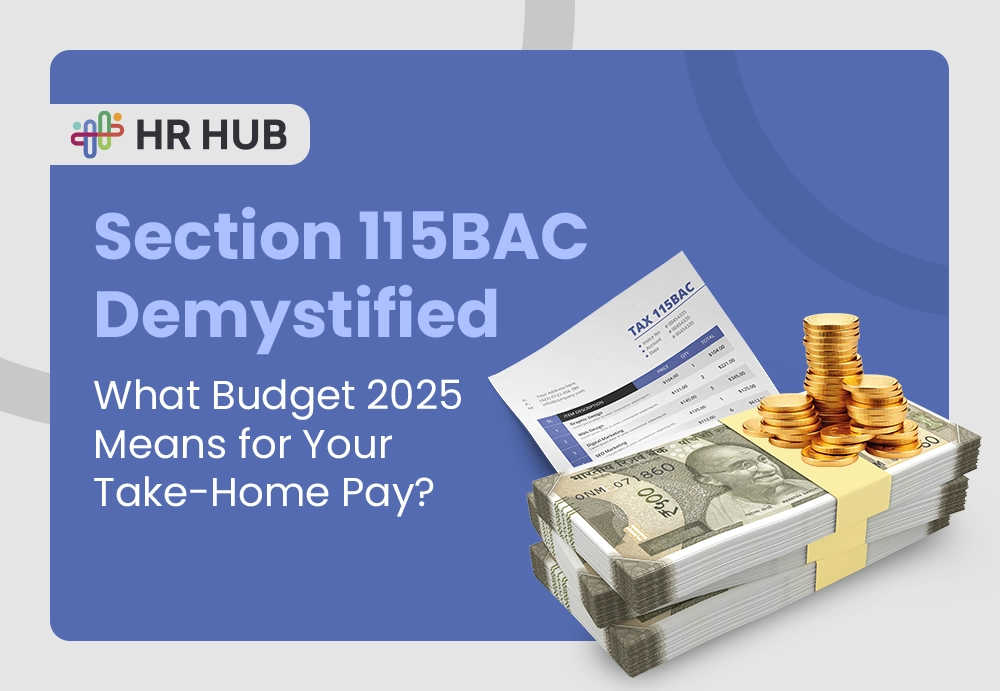"Stay late and finish it"—we’ve all heard it. But is your extra time at work just dedication, or are you entitled to be paid for it?
In today’s hustle culture, putting in extra hours has become the norm. But legally speaking, every minute beyond your standard work hours could be worth double. The trouble? Most employees don’t even know they’re being shortchanged.
Let’s break down everything you need to know about overtime (OT)—from how it's calculated to who is eligible and what to do if your employer doesn’t pay up.
What is overtime?
Overtime is not just “working late.” Legally, overtime refers to any hours worked beyond the prescribed limits.
- More than 9 hours a day, or
- More than 48 hours in a week
This is defined under the Factories Act, 1948, and reinforced by various Shops & Establishments Acts across Indian states.
Example: A warehouse employee works from 9:00 AM to 7:00 PM, with a 1-hour lunch break. That’s 9 working hours. If they continue till 8 PM, they’ve worked 10 hours, and 1 hour becomes eligible for OT.
How is overtime pay calculated?
Here’s where most employees get tricked.
Legally, overtime must be paid at twice (2x) the normal hourly rate—this is non-negotiable under Indian labor laws.
Overtime Pay = 2 × (Monthly Basic Salary ÷ 26 ÷ 8) × OT Hours
Let’s Simplify:
Suppose a worker earns ₹20,800 per month as their basic salary.
- Per Day Wage = ₹20,800 ÷ 26 = ₹800
- Hourly Wage = ₹800 ÷ 8 = ₹100
- Works 2 OT hours = 2 × ₹100 × 2 = ₹400 OT pay for the day
So, if your employer is paying:
- Same hourly rate (1x) ➝ Illegal
- 1.5x hourly rate ➝ Still illegal
- 2x hourly rate ➝ Correct as per Indian labor laws
Note: Companies cannot create HR policies that contradict national labor laws. Even if your offer letter says “1.5x,” it’s not valid legally.
When is overtime applicable?
Overtime applies in these common scenarios:

Tip: Always record your hours via biometric, app-based check-ins, or emails to prove your OT claim if needed.
Who is NOT Eligible for Overtime?
According to the law, certain employees are excluded from OT eligibility, especially:
- Managerial or Supervisory roles
- Those not defined as ‘workers’ under labour laws.
Designations That Typically Don’t Qualify:
- Team Leads
- Project Managers
- Product Managers
- HR Managers
But here’s the twist: If you’re titled as a manager but doing clerical or operational tasks, and your salary is below a certain threshold (varies by state), you might still be eligible. This can be challenged legally.
What About Comp-Offs?
If you work on your weekly day off or a public holiday, your company may offer you:
- Double pay, OR
- Comp-Off (a paid leave on another day)
Both are acceptable. But if you work extra hours on that same holiday, you’re still entitled to OT pay, even if a comp-off is given.
Example: You work 10 hours on a Sunday (your official day off). You get Monday off as a comp-off.
The extra 1 hour beyond 9 hours still qualifies for OT.
What Can You Do If You’re Not Paid OT Fairly?
- Approach HR: Politely question your OT calculations with backup (screenshot, logs).
- Internal Grievance: Many companies have a grievance cell or HR escalation process.
- Labour Commissioner Complaint: If HR doesn’t resolve it, approach your state’s Labour Department.
Many states now allow online complaints.
Bonus: Can You Refuse to Work Overtime?
Yes. Overtime cannot be forced. If your employer compels you to work extra without consent or pay:
- It violates labour law
- You may file a forced labour complaint under the Bonded Labour Abolition Act.
Before You Punch Out
In a world that runs on overcommitment, it’s easy to clock in extra hours without ever clocking in extra pay. But knowing your rights changes the game. Whether you’re working in a manufacturing plant, a retail store, or a tech office, overtime isn’t just about money—it’s about respect for your time.
And if you’re tired of chasing approvals, logging hours manually, or wondering if your OT is being calculated right, it might be time for your company to upgrade its systems.
HR HUB is built to do exactly that—bringing transparency, automation, and legal accuracy into every aspect of workforce management. From real-time overtime logs to automated payroll calculations, HR HUB ensures no minute goes untracked and no effort goes unpaid.
Because your time is valuable, and finally, there’s a system that treats it that way.






